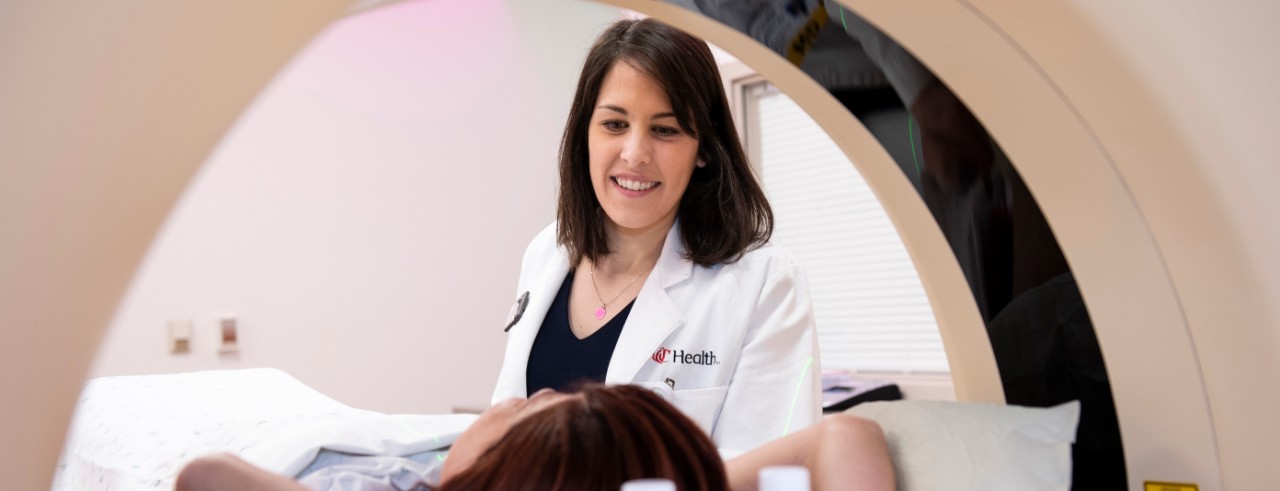
WINK-TV Fort Myers: First-in-human trial tests faster proton therapy
A new first-in-human trial led by University of Cincinnati researchers suggests a certain radiation treatment, which delivers therapeutic doses of radiation in a fraction of a second, may hold promise as a potential treatment for tough-to-kill tumors.
The technology, called FLASH radiation treatment (FLASH RT), delivers radiation at dose rates that are more than 300 times higher than those used in conventional radiation treatments. This induces a phenomenon known as the FLASH effect, which reduces the harm that may occur to normal tissue surrounding a tumor during conventional radiation therapy, while still killing the cancer cells at the tumor site.
“It differs from the conventional type of radiation therapy in that we can steer it differently, John Breneman, MD, principal investigator on the trial and a professor of radiation oncology at the University of Cincinnati Cancer Center, told Fort Myers' WINK-TV. “So, a treatment that might typically take a minute would be delivered in a half a second. That can even further spare some of the normal tissue from the effects of radiation."
Breneman also serves as medical director of the Cincinnati Children's/UC Medical Center Proton Therapy Center where the trial was conducted.
John Perentesis, MD, research director of the Proton Therapy Center, said while the current research is limited to adults, the hope is that it can one day be applied to pediatric patients.
“One research question is, will FLASH be able to help us cure kids with D.I.P.G. or other tumors that we can’t cure right now?,” Perentesis said.
Watch the report on WINK-TV or WEGM-TV.
Radiology Today recently featured Emily Daugherty, MD, assistant professor of clinical radiation oncology at the University of Cincinnati Cancer Center, in an article about FLASH treatment. Read the Radiology Today article.
Featured photo at top of Dr. Emily Daugherty with a patient. Photo/Colleen Kelley/UC Marketing + Brand.
Related Stories
President picks exceptional talent
April 28, 2021
The University of Cincinnati 2021 Presidential Leadership Medal of Excellence Awards honor six undergraduate scholars for scholarship, leadership, character, service and the ideals of the university. Awardees are spotlighted for exceptional academics, creativity, community service and innovation.
Grad students earn president's highest honor
April 28, 2021
The University of Cincinnati 2021 Presidential Medal of Graduate Student Excellence Awards honor three graduate scholars for scholarship, leadership, character, service and the ideals of the university. Awardees are spotlighted for exceptional academics, creativity, community service and innovation.
UC student leads effort to clean up campus adjacent Coy Field
April 7, 2021
Karthikeyan Sakthivel, a senior medical sciences undergraduate at the University of Cincinnati, has adopted Coy Field in an attempt to keep the green space clean and ready for use by UC students, area high schoolers and the community. Sakthivel is planning another cleanup event for Coy Field, which is adjacent to the university campus.
The making of a successful Faculty & Staff Campaign
May 25, 2021
More than one-third of UC’s nearly 7,000 faculty and staff have already contributed to the 2020-21 Faculty & Staff Campaign, putting the goal of 45% within reach.
Finding community and building a future
July 9, 2021
As a University of Cincinnati College of Medicine student, Sarah Appeadu, MD, ’21, remembers journaling on the “3 Cs” that got her through medical school: Community, community, community. Now, when she lists the people who supported her through four years of training—the last year in a global pandemic—it keeps growing: her family, her church, her classmates, and the college’s Office of Student Affairs and Office of Diversity, Equity and Inclusion. “I look back and it was such a crucial time to really be nurtured in that way,” she says. “I’m so thankful that I had those people. It shows being around the right people really mattered. That’s my same hope for residency even.”
New York Times: Flint Weighs Scope of Harm to Children Caused by Lead in Water
February 1, 2016
Kim Dietrich, a professor of environmental health at UC's College of Medicine, is quoted in this story on the medical problems that could develop among the thousands of young children exposed to lead-contaminated water in Flint, Mich.
Cancer-Causing Gene Found in Plasma May Help Predict Outcomes for Patients
February 18, 2016
Researchers at the University of Cincinnati have discovered that a human cancer-causing gene, called DEK, can be detected in the plasma of head and neck cancer patients.
UC Receives $1.9 Million to Study Pain
February 15, 2016
Jun-Ming Zhang, MD, of the UC College of Medicine, is the principal investigator of a $1.95 million grant to study the interacting roles of the sympathetic and sensory nervous and immune systems in back and neuropathic pain models.
MD Magazine: Generic Drug Equally Effective in Epilespy
February 22, 2016
Michael Privitera, MD, a professor of neurology at UC's College of Medicine and director of the Epilepsy Center at the UC Neuroscience Institute, is featured in this story about research he led that examined the efficacy of generic drug substitution for epilepsy.
UC to Host Regional Conference for Latino Medical Student Association
February 10, 2016
The University of Cincinnati chapter of the Latino Medical Student Association (LMSA) will host a Midwest regional conference Feb. 26-28, 2016, at the College of Medicine.
